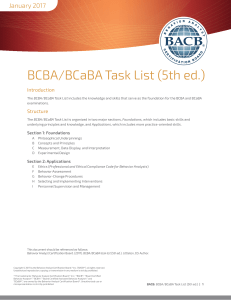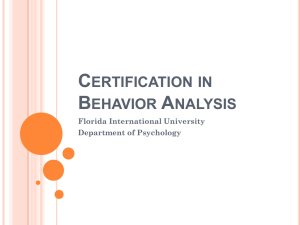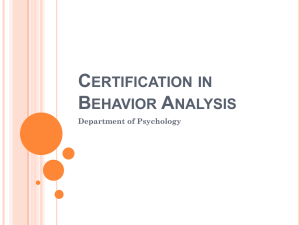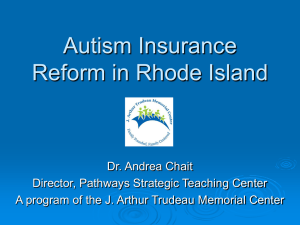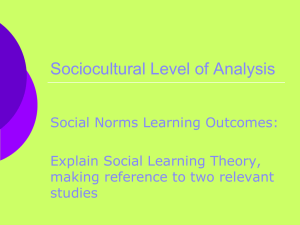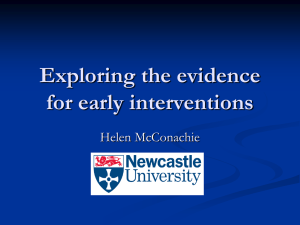File
advertisement
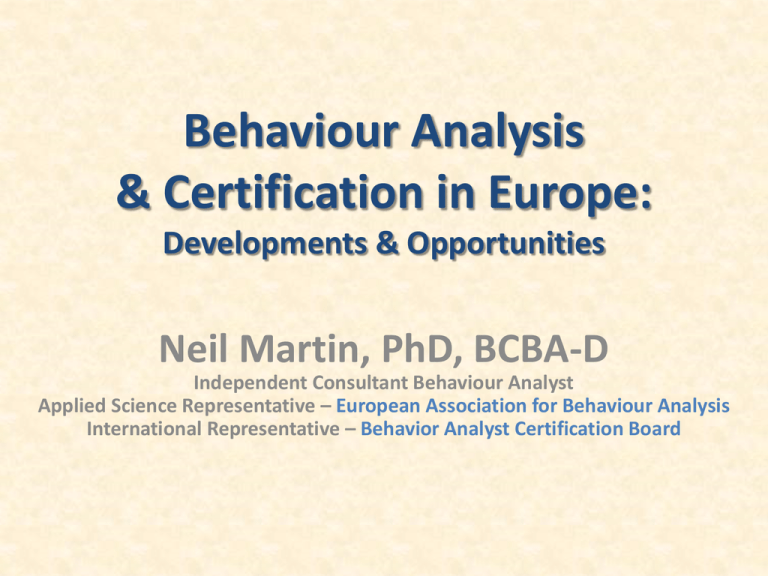
Behaviour Analysis & Certification in Europe: Developments & Opportunities Neil Martin, PhD, BCBA-D Independent Consultant Behaviour Analyst Applied Science Representative – European Association for Behaviour Analysis International Representative – Behavior Analyst Certification Board BIA & ABA The STAMPPP Context… Behavioural intervention for autism is an intervention, or perhaps better described as educational provision, that is based on the principles, and uses the methodology of, Applied Behaviour Analysis - ABA BIA & ABA • The Autism Special Interest Group (SIG) of the Association for Behavior Analysis asserts that all children and adults with autism spectrum disorders have the right to effective education and treatment based on the best available scientific evidence. Is it BIA or Is It Something Else? • The definition and quality of provision is determined by the skills and competencies of those responsible for the provision (i.e. behaviour analysts) • Skills and competencies are developed through: – Advanced academic training in behaviour analysis… not a couple of workshops! – Extensive hands-on experience (including supervisory experience) of teaching individuals with autism using the principles and methods of the science of behaviour analysis – Evidenced through credentialing Professional Credentialing The only recognised worldwide credential for behaviour analysts exists through the Behavior Analyst Certification Board (BACB®) Board Certified Assistant Behavior Analyst (BCaBA) Eligibility Standards Coursework Requirement 135 classroom hours in behavior analysis • Ethics - 10 hours • Basic concepts & principles – 40 hours • Behavioral methodology – 20 hours • Behavioral assessment – 25 hours • Behavior-change procedures – 40 hours Degree Requirement A minimum of a bachelor's degree that was conferred in behavior analysis or other natural science, education, human services, engineering, medicine or a field related to behavior analysis and approved by the BACB Experience Requirement 1000 hours of Supervised Independent Fieldwork Board Certified Behavior Analyst (BCBA) (BCBA-D) Eligibility Standards Coursework Requirement 225 classroom hours in behavior analysis • Ethics – 15 hours • Basic concepts & principles – 45 hours • Behavioral assessment – 35 hours • Behavioral methodology – 40 hours • Behavior-change procedures – 45 hours • Discretionary content - 45 hours Degree Requirement A minimum of a master’s doctoratedegree degreethat that was conferred in behavior analysis or other natural science, education, human services, engineering, medicine or a field related to behavior analysis and approved by the BACB Experience Requirement 1500 hours of Supervised Independent Fieldwork Supervised Experience 1500 hours – BCBA 1000 hours – BCaBA Appropriate applicant activities: • Primary focus on behaviour analytic skills related to BACB Task List • Must adhere to dimension of application of behaviour analysis as described by Baer, Wolf & Risley (1968) • Applicants are encouraged to have experience across multiple sites and supervisors Supervised Experience Appropriate applicant activities include: • Conducting assessment activities related to the need for behavioural interventions • Designing, implementing, and monitoring behavior analysis programs for clients • Overseeing the implementation of behaviour analysis programs by others Supervised Experience Appropriate applicant activities include othe activities normally performed by a behaviour analyst such as: • Meetings related to the behaviour analysis program • Literature searches related to the program • Supervision and evaluation issues etc. The supervisor will determine if activities qualify… BACB Certification Coursework Supervised Experience Degree The Exam Cumulative BACB Certificants 12000 10,177 10000 8000 FL 6000 BCaBA BCBA 4000 2000 0 1999 2000 2001 2002 2003 2004 2005 2006 2007 2008 2009 2010 2011 Cumulative Non-US BACB Certificants 800 700 667 600 500 BCaBA 400 BCBA 300 200 100 0 2000 2001 2002 2003 2004 2005 2006 2007 2008 2009 2010 2011 Current Non-US BACB Certificants Australia 12 Hungary 1 Saudi Arabia 9 Bahrain 1 Iceland 3 Singapore 1 Belize 1 India 8 South Korea 9 Bermuda 2 Ireland 53 Sweden 6 Bulgaria 1 Israel 54 Switzerland 4 Canada 287 Italy 14 Taiwan 6 China 1 Japan 4 Thailand 1 Colombia 1 Kuwait 2 The Netherlands 3 Costa Rica 1 Mexico 1 UK: England 80 Cyprus 3 New Zealand 17 UK: N Ireland 16 France 12 Norway 1 UK: Scotland 4 Germany 8 Peru 1 UK: Wales 13 Greece 2 Poland 4 United Arab Emirates 7 Hong Kong 10 Romania 3 EUROPE 238 Cumulative Approved Course Sequences (ACSs) 350 309 300 250 200 BCaBA BCBA 150 100 50 0 99-00 00-01 01-02 02-03 03-04 04-05 05-06 06-07 07-08 08-09 09-10 10-11 11-12 Course Sequences per Academic Department 160 140 120 100 BCaBA 80 BCBA 60 40 20 0 Education Psychology Other Counseling Behavior Analysis Human Services Medicine Sociology Cumulative Non-US ACSs 60 53 50 40 BCaBA 30 BCBA 20 10 0 99-00 00-01 01-02 02-03 03-04 04-05 05-06 06-07 07-08 08-09 09-10 10-11 11-12 Current Non-US BACB ACS Locations Canada 6 Romania 1 China 1 Russia 2 Croatia 1 Saudi Arabia 1 Finland 1 South Korea 2 France 1 Spain 2 Ireland 5 Sweden 1 Israel 3 Taiwan 2 Italy 1 UK – England 1 New Zealand 2 UK – Northern Ireland 1 Norway 1 UK – Wales 3 Poland 1 Portugal 1 EUROPE 23 European BACB ACSs Developments & Opportunities • STAMPPP provides some dissemination of the science of behaviour analysis across Europe (… and elsewhere…?) • STAMPPP will (hopefully) provide some impetus for interest in the training of the science Developments & Opportunities • The biggest barriers are: –Misinformation and inaccuracies about our science… –Lack of available expertise in many countries –General problems with acquiring training + supervision Developments & Opportunities • STAMPPP may pave the way the for training in the science using evolving technologies such as: –Remote access (e.g. online exemplar courses) –Multi-media resources –Virtual training environments etc. Dank u! Developments & Opportunities • STAMPPP may pave the way the for training in the science using evolving technologies such as: –Remote access (e.g. online exemplar courses) –Multi-media resources –Virtual training environments etc.
